The Dubious Land Deal Threatening East Jerusalem’s Armenian Quarter
In April 2023, the community learned that an Israeli real estate company would soon construct a hotel on one-fourth of their land. “Progressively, we will lose everything.”
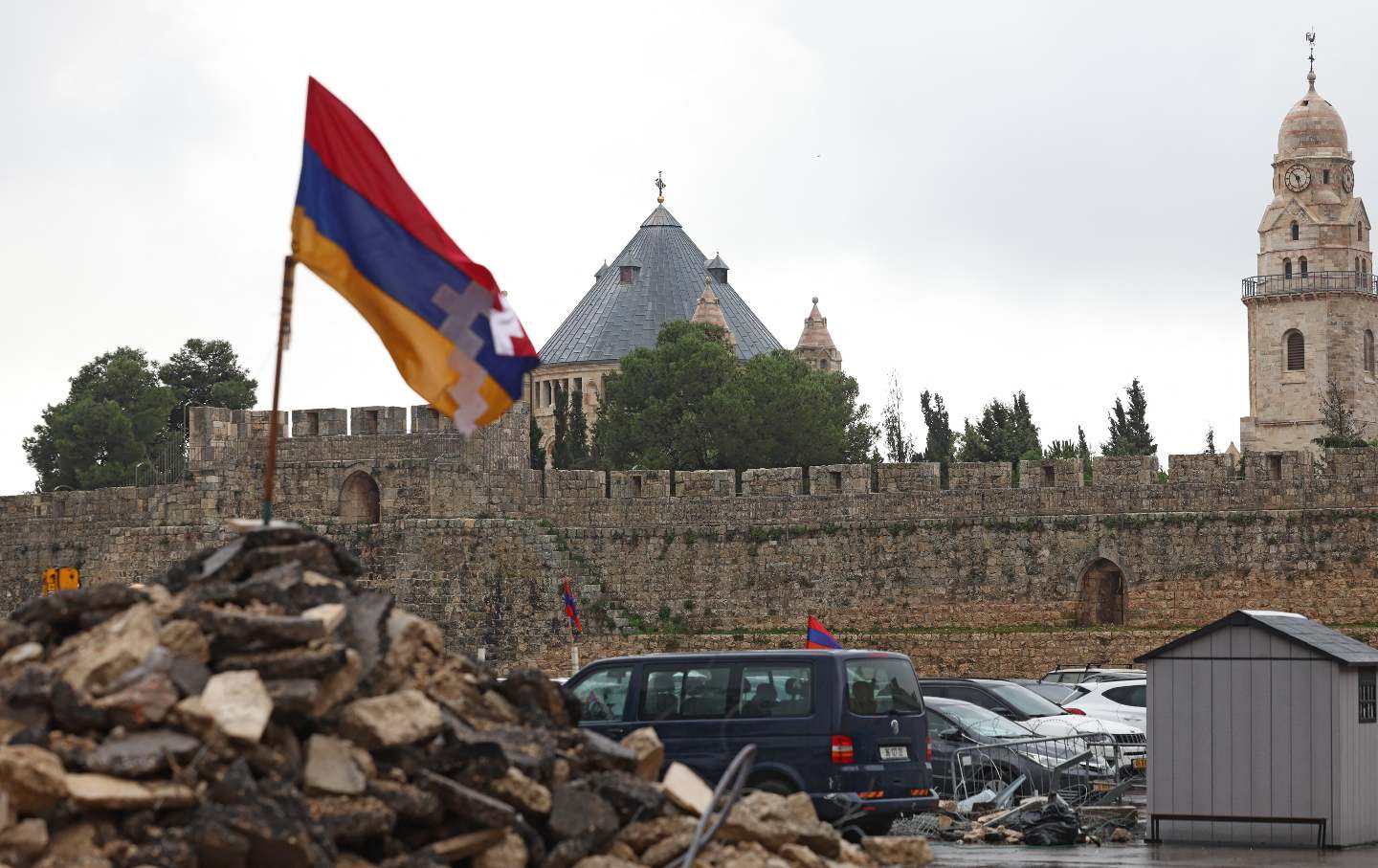
The Armenian car park in the Old City of Jerusalem in December 2023.
(Ahmad Gharabli / Getty)When he was growing up in the Armenian Quarter of Jerusalem, Kegham Balian spent Easters watching different Christian denominations fight turf battles in the Church of the Holy Sepulchre, the holiest site in the Christian faith. Life in the Jerusalem of Balian’s childhood was complex and contentious, but it was also “quite the scene,” said Balian, now an adult.
It is a scene that has rapidly changed since then. In the past few decades, Jerusalemite Christians—a diverse group comprising Armenians, Palestinians, Ethiopians, and others—have endured harassment and violence from increasingly emboldened Israeli extremists who believe non-Jews should be expelled from the city. “It’s not conducive to maintaining the Christian population” in Jerusalem, Balian said. “You’re treated as a second-class citizen.”
For Balian, the tipping point came in April 2023, when he learned that the Armenian Patriarchate, which oversees the affairs of the community, had inexplicably struck a secret deal with an Israeli real estate company to build a hotel on one-fourth of the Armenian Quarter’s land. “It’s a plot of land [in our possession] since the 1300s and bought with blood, sweat, and a lot of fights,” Balian said. “To have it whisked away with a simple signature—it’s ridiculous.”
The deal poses an existential threat to the 2,000-member-strong Armenian diaspora in Jerusalem, which has been part of the Christian presence in the city since the fourth century. Construction of the hotel will likely force the closure of the Quarter’s Armenian seminary—one of only three such educational institutions in the world—and lead to “the extinction of the next generation” of priests, Balian said. “If we’re dealt the blow of losing [the land], a lot less people will be here.”
That might just be what the deal is designed to do. Under its terms, the Armenian Patriarchate will be paid a mere $300,000 annually on a 98-year-lease for one of the most valuable properties in the world; meanwhile, the priest who negotiated the arrangement has since fled Jerusalem amid accusations of bribery and corruption. Xana Capital Group, the Dubai-registered Israeli firm at the center of the deal, also allegedly has ties to the Israeli settler movement, which seeks to claim all of Jerusalem for the Jewish people alone.
“There is no way in the world this is a financial deal,” said Daniel Seidemann, a lawyer who specializes in Israel-Palestine relations in Jerusalem. “That’s part of the whole absurdity of this. This is one of the choicest pieces of property on the planet, and you’re going to be selling it to two unknowns with no financial backing.”
Since learning of the deal’s existence, the Armenian community has moved to defend their land. Balian now serves as the communications director for Save the ArQ, an advocacy group mounting both a public awareness and legal campaign to keep the Armenian Quarter in the hands of its residents; Seidemann advises the organization in a nonlegal capacity. Under pressure from Save the ArQ, Armenian Patriarch Nourhan Manougian has announced that he intends to back out of the deal; a legal battle that could drag on for years is now taking shape in the courts. (Manougian has denied knowledge of the deal and alleges that he was misled by the priest who fled Jerusalem.)
Jerusalemite Armenians, along with the rest of the city’s Christian community, view the dispute over the Armenian Quarter’s land as the most recent battle in a wider, decades-long struggle to preserve a multicultural Jerusalem. Given the stakes, Balian knows that the Easter brawls of his childhood will have to be set aside, at least for now. “We don’t have time for that anymore.”
The Old City of Jerusalem, a walled parcel of land in East Jerusalem just over one-third of a square mile in area, is home to major holy sites for the three main Abrahamic religions—Christianity, Islam, and Judaism. Jerusalem has existed as a contested city for millennia; control over the land has changed hands at least 20 times. But since 1967, after Israel annexed East Jerusalem from Jordan in the Six-Day War, the Old City has been under Israeli administration. Most of the international community considers East Jerusalem, which includes the Old City, to be illegally occupied.
In 1977, when Israel’s first right-wing government came to power, Israel began to confiscate Palestinian property in East Jerusalem and directly transferred the land to Jewish settlers using a highly controversial legal mechanism. By the early 1990s, a flurry of public criticism largely forced a halt to the practice under the liberal Rabin government.
Yet settlers quickly came up with a new tactic to claim the land. Now, one “of the main ways for settlers to take over land properties in East Jerusalem is through purchasing it from the owners,” said Hagit Ofran, director of the Settlement Watch project at Peace Now, a left-wing Israeli NGO. “Almost 100 percent of the deals are dirty or involved with some monkey business. It’s not a clear-cut dispossession because of the alleged purchases, so you don’t see the injustice so strongly.”
The same strategy was adapted for the Old City. Aside from buying Palestinian properties in the area, settlers realized they could target Jerusalem’s Christian churches, which hold vast amounts of real estate in the Old City, yet exist on the periphery of the scrutiny directed at Palestinian land dispossession.
In fact, the dispute over the Armenian Quarter’s land follows a long-standing playbook. On the morning of March 18, 2005, an Israeli journalist told Abu El-Walid Dajani that the Greek Orthodox Patriarchate had ceded the hotel his family had leased and managed since 1949 to Ateret Cohanim, a far-right settler organization that pledges to stand at the “forefront of Jewish Land Reclamation in Jerusalem,” according to their website. As with the case of the Armenian Quarter, the Greek Orthodox Patriarchate had also inexplicably leased away its land for far below market value in a secret deal, and the priest who oversaw the deal was similarly accused of corruption. Perhaps not coincidentally, the owners of Xana Capital Group have been photographed with representatives from Ateret Cohanim. (Ateret Cohanim has denied involvement with the deal in the Armenian Quarter.)
In 2021, after a nearly 20-year-long legal battle, the Israeli Supreme Court ruled that Ateret Cohanim held the legal right to the Greek Orthodox Patriarchate’s land. The decision has had far-reaching repercussions. In recent years, the Palestinian Christians who make up the majority of the Greek Orthodox community have come to believe “there is no future for the youngsters,” said Dajani. “The youngsters [in the community] go out to secure an education and they don’t come back. They try to find a better way of life. It’s not easy to live under stress.”
Dajani, a Palestinian and practicing Muslim who worked at a Catholic university for many years, fears he is now witnessing the transformation of Jerusalem into an exclusively Jewish city. “There is enough room for everybody” in Jerusalem, Dajani said. “Don’t come with an ideology [saying] that God is a real estate man. I never knew this. There’s not a single thing on Earth that says God is a real estate man.”
And, for the Armenians who have seen armed settlers begin the process of occupying the Greek Orthodox Patriarchate’s land, the situation offers potent warning of what could soon happen to the Armenian Quarter. “They will just keep on encroaching and encroaching,” Balian said. “Progressively, we will lose everything.”
The Israeli settlers care more about their own Jewish identity—and what it says about their claim to the Old City—than the identities of those they take property from, according to Seidemann. “The Armenian community is not being targeted because they’re Armenian,” he said. “They’re not being targeted because they’re Christian. They are being targeted because they’re in the way, and Christians, Armenians, Muslims, and Palestinians are fungible assets.”
Yet there is no escaping the fact that much of the Armenian community in Jerusalem, including Balian’s family, came to the city in the aftermath of the Armenian genocide of 1916, which led to the deaths of 1.5 million Armenians. In modern times, Armenia has accused Azerbaijan of ethnically cleansing Nagorno-Karabakh, a once-autonomous region of Azerbaijan home to some 100,000 ethnic Armenians, after the Azeri military seized the territory in 2020.
The roughly 7,000 Christians who live in the Old City also constitute an extremely vulnerable population. A century ago, Christians made up 11 percent of the Old City’s population; today, that number is down to 1 percent. “We’re seeing, in the last [few] years, a real deterioration in the public presence of Christians in the Old City,” Ofran said.
Popular
“swipe left below to view more authors”Swipe →Much of this decline is a result of unceasing hostility from Israeli extremists: Priests are spat on in the streets, buildings are vandalized with graffiti, and church windows need to be replaced monthly after stones are thrown at them, said Abbot Nikodemus Schnabel, who heads the Catholic Dormition Abbey of Jerusalem.
The situation only worsened after the Jerusalem police were placed under the purview of National Security Minister Itamar Ben-Givr, a far-right politician known for representing Jewish extremists accused of anti-Christian hate crimes in court. “This man now is in charge of my security,” Schnabel said. “The quantity of attacks has exploded.”
Since last April, the Armenian Quarter has faced its own share of ugly tactics. In late October, Xana Capital sent a bulldozer to the Armenian Quarter’s land and demolished part of a wall on the property, in clear violation of Israeli law. (Even if the lease were to go through, the land would be ceded to Xana in six years’ time, not immediately.) In early November, Xana’s leaders, accompanied by armed Israeli settlers and attack dogs, turned up on the site, sparking a tense confrontation.
In response, members of Save the ArQ have built a makeshift hut on the Armenian Quarter’s land; Balian and his friends take shifts staying—and sleeping—within the structure to ensure that there is always someone guarding the site. “[In the last few months] I’ve slept more in this tent than I’ve slept next to my girlfriend,” Balian said, pointing to a green camping tent set up inside the hut.
Much damage has already been done. Relations between the Armenian community and the patriarchate are tense, Balian said, after Manougian filed a separate lawsuit against Xana instead of joining Save the ArQ’s lawsuit. Jordan and the Palestinian Authority have also withdrawn their recognition of Manougian as the Armenian patriarch, leaving his leadership of the community in question. The outcome of the legal battle ahead is deeply uncertain.
But for now, the Armenian community is determined to fight on—both for their land and the promise of a pluralist Jerusalem. “The multicultural ethnic diversity within Jerusalem is what contributes to the cultural wealth of Jerusalem,” Balian said. “Armenians have a right to stay here. Jews have the right. Palestinians have the right. We don’t differentiate between our rights or their rights. What we ask for is for everyone else to respect our rights to this land.”
We need your support
What’s at stake this November is the future of our democracy. Yet Nation readers know the fight for justice, equity, and peace doesn’t stop in November. Change doesn’t happen overnight. We need sustained, fearless journalism to advocate for bold ideas, expose corruption, defend our democracy, secure our bodily rights, promote peace, and protect the environment.
This month, we’re calling on you to give a monthly donation to support The Nation’s independent journalism. If you’ve read this far, I know you value our journalism that speaks truth to power in a way corporate-owned media never can. The most effective way to support The Nation is by becoming a monthly donor; this will provide us with a reliable funding base.
In the coming months, our writers will be working to bring you what you need to know—from John Nichols on the election, Elie Mystal on justice and injustice, Chris Lehmann’s reporting from inside the beltway, Joan Walsh with insightful political analysis, Jeet Heer’s crackling wit, and Amy Littlefield on the front lines of the fight for abortion access. For as little as $10 a month, you can empower our dedicated writers, editors, and fact checkers to report deeply on the most critical issues of our day.
Set up a monthly recurring donation today and join the committed community of readers who make our journalism possible for the long haul. For nearly 160 years, The Nation has stood for truth and justice—can you help us thrive for 160 more?
Onwards,
Katrina vanden Heuvel
Editorial Director and Publisher, The Nation
More from The Nation
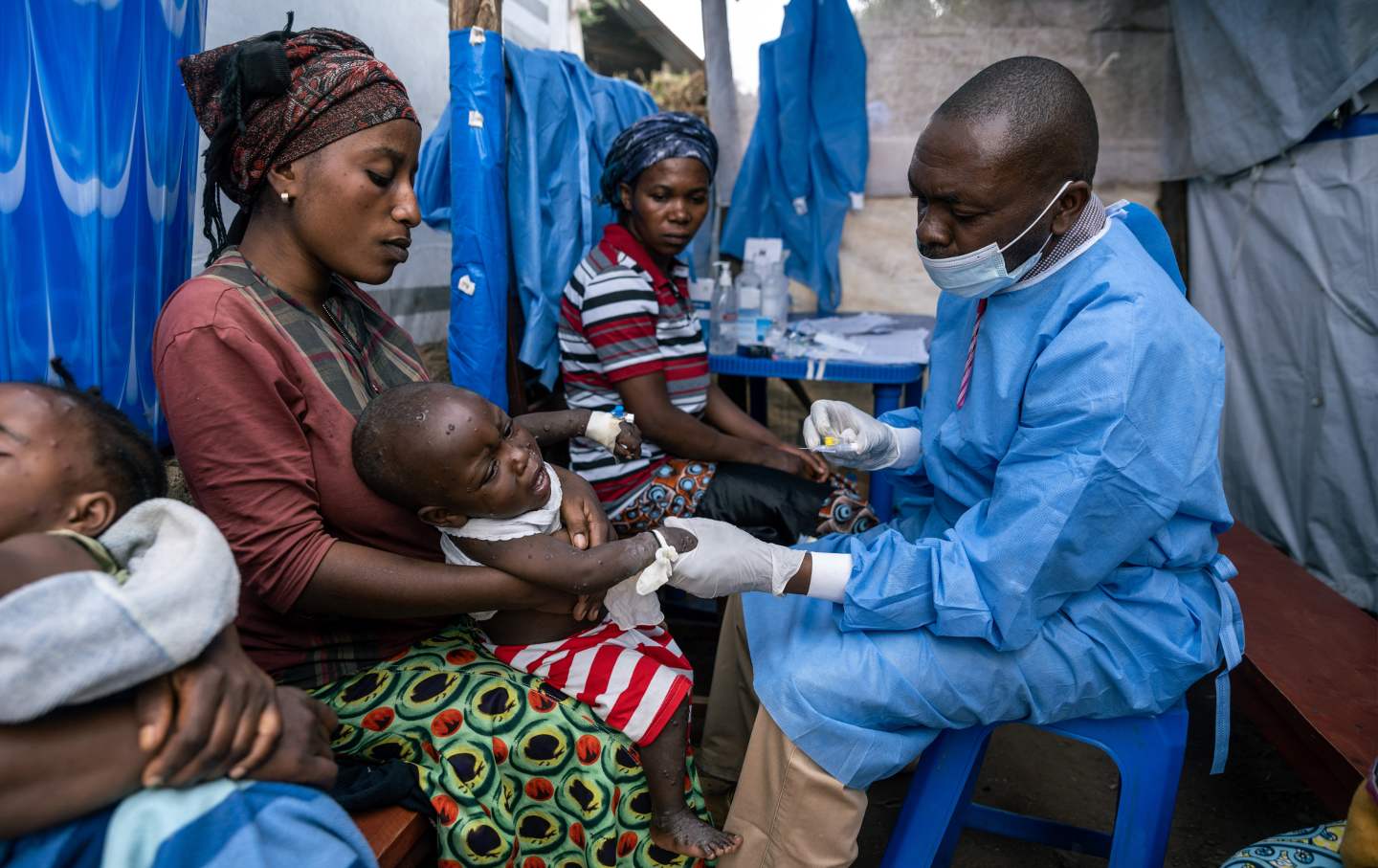
The Mpox Outbreak Is a Damning Indictment of the Global Health System The Mpox Outbreak Is a Damning Indictment of the Global Health System
The inequalities and injustices in our medical infrastructure have made the outbreak so much worse than it could have been.
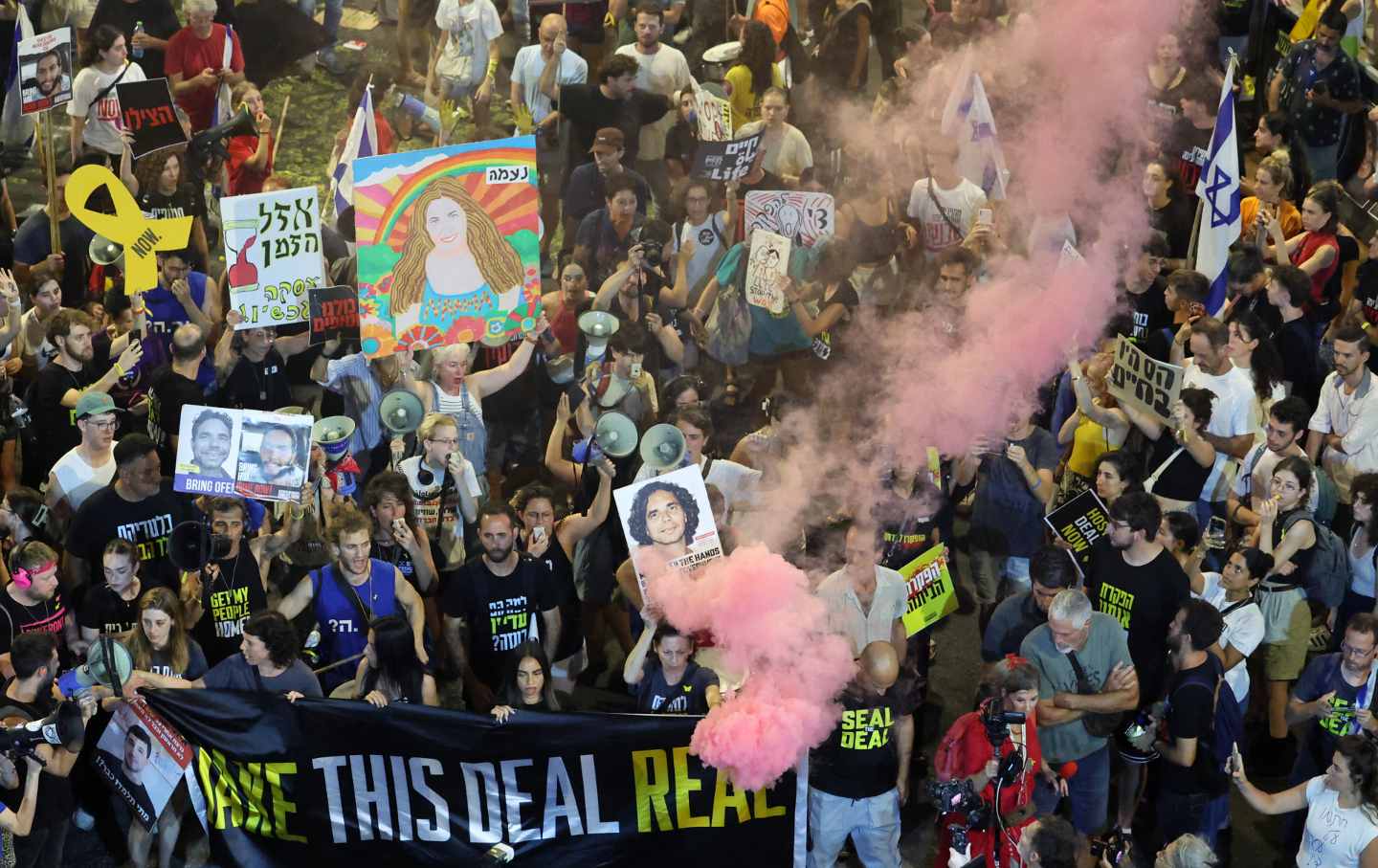
Israeli Protesters Have Chosen a Side Israeli Protesters Have Chosen a Side
Fearing for the remaining captives, the mass rallies that erupted across Israel were essentially demanding an end to the war—and Netanyahu knows it.
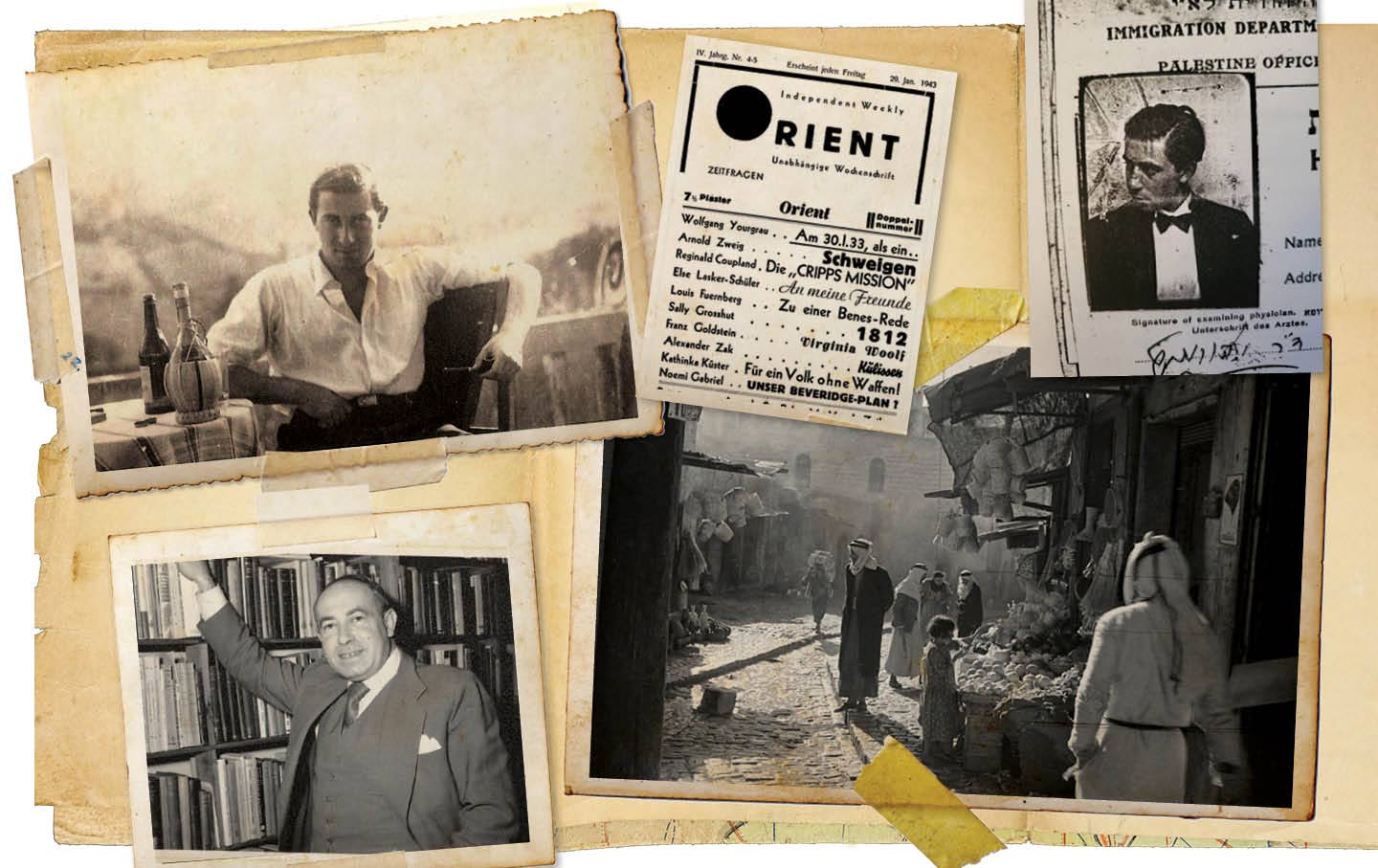
Lessons of a Weimar Anti-Fascist in Palestine Lessons of a Weimar Anti-Fascist in Palestine
After my father fled Nazi Germany in 1933, he witnessed a toxic new nationalism rising among Jews in Palestine—and was silenced for trying to warn of its dangers.
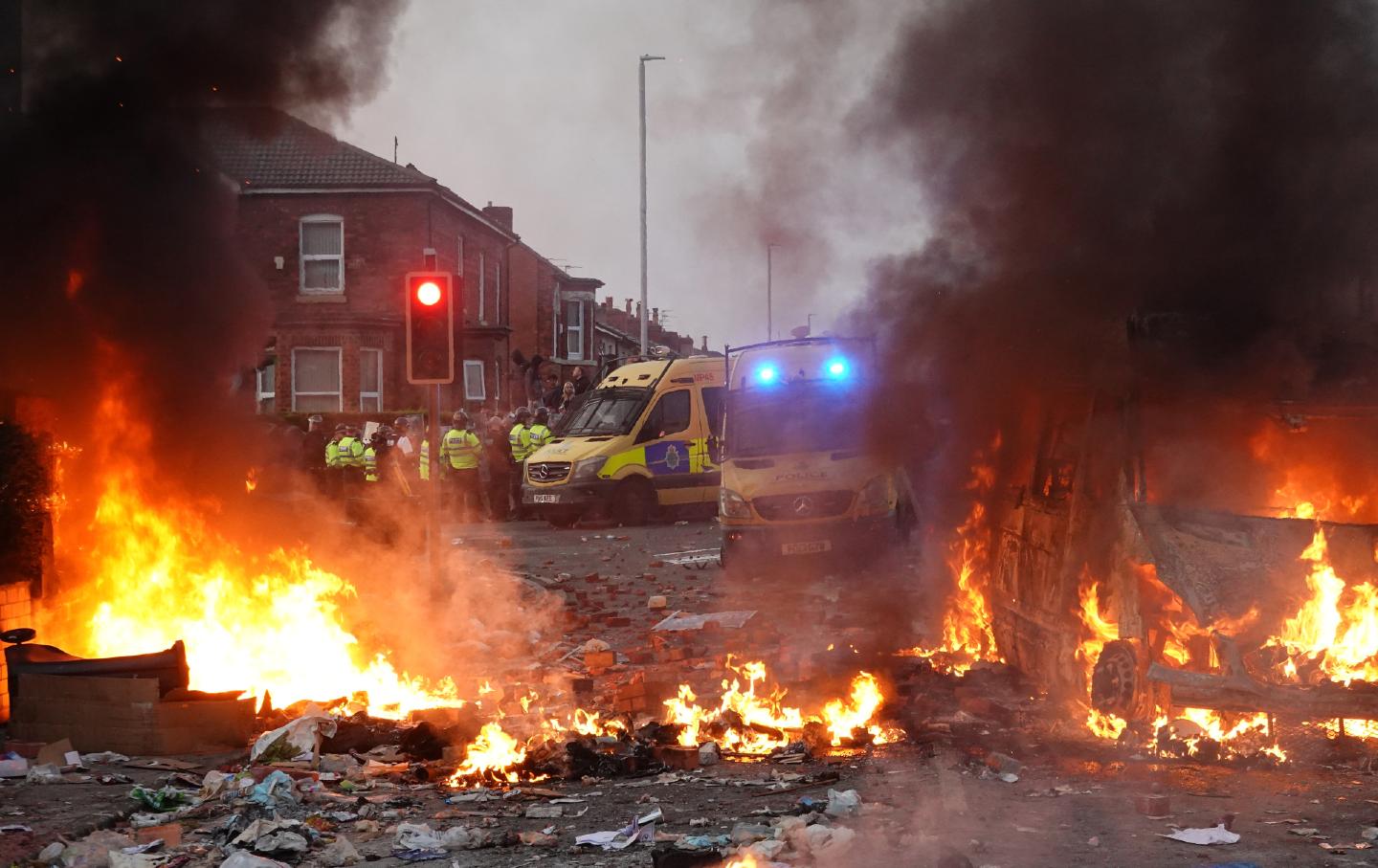
The Recent Riots in the UK Should Be a Warning to Kamala Harris The Recent Riots in the UK Should Be a Warning to Kamala Harris
Like the Tories, the new Labour government wants to blame immigration for Britain’s current troubles, but these have less to do with immigration than with deprivation.
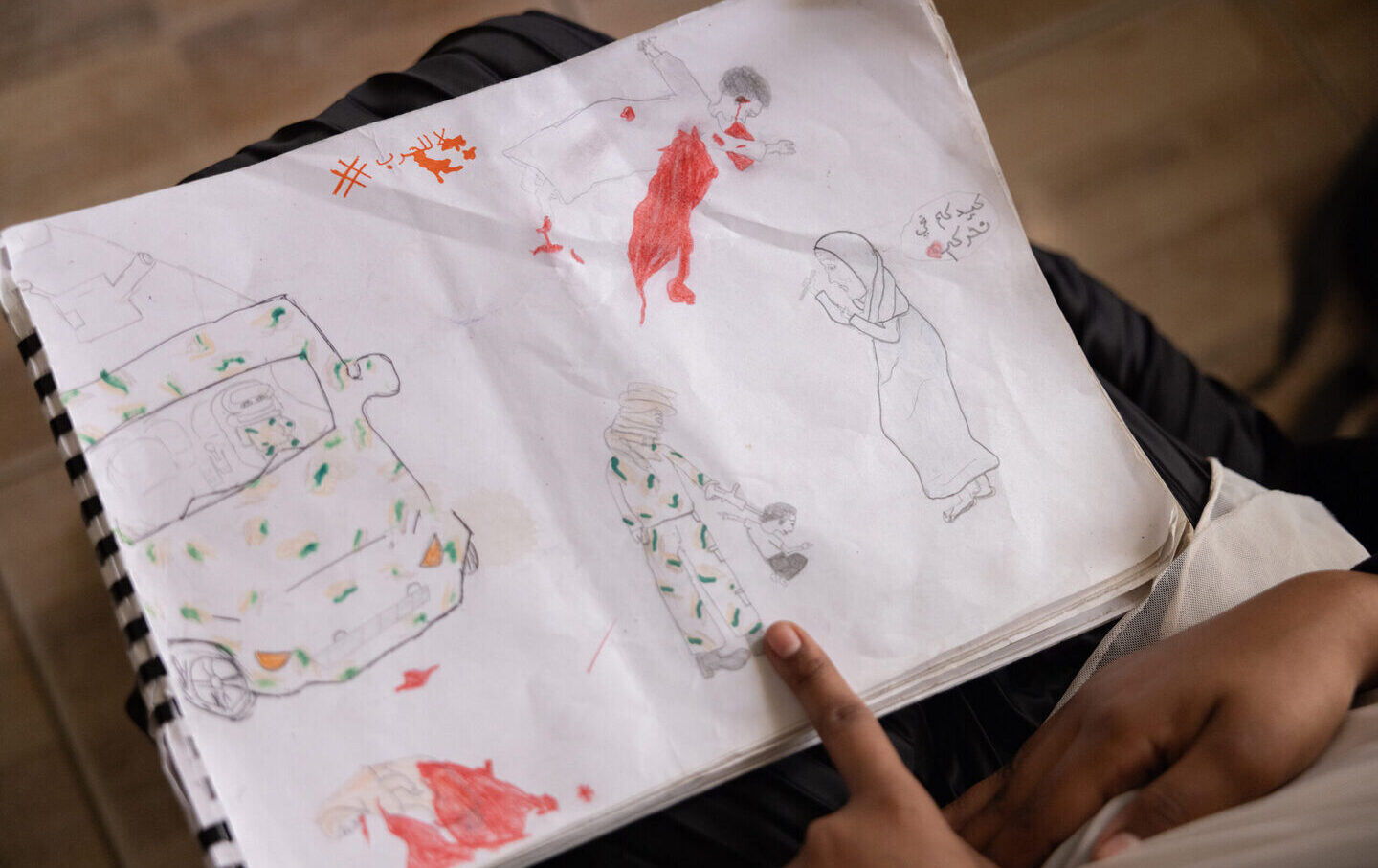
Displaced From Sudan, Young Refugees Find Solace at School Displaced From Sudan, Young Refugees Find Solace at School
After fleeing war-torn nightmares, refugees in neighboring Egypt are finding a way to dream again.
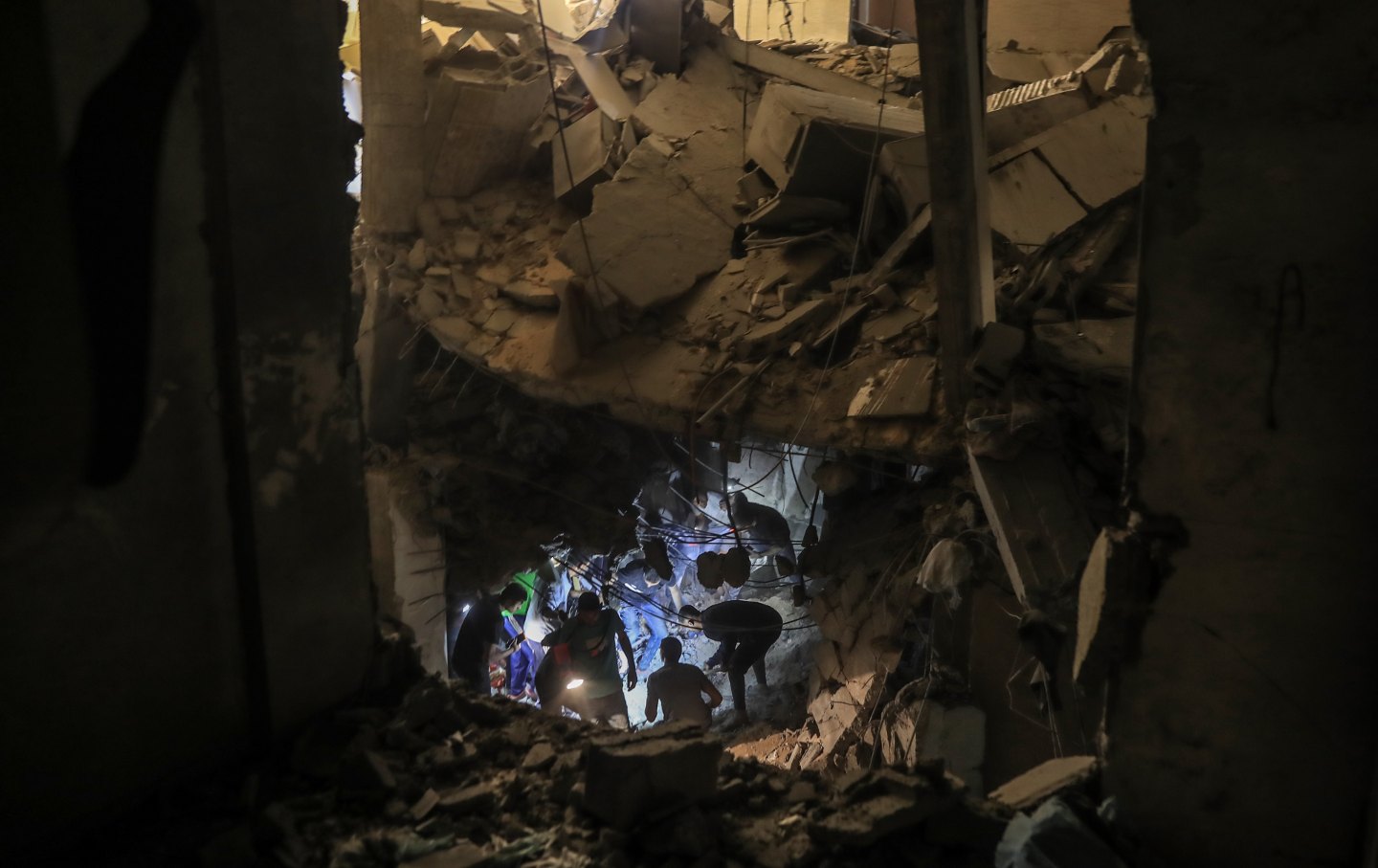
“I Couldn’t Ask if She Was Still Alive”: A Girl, Her Mother, and a Bloody Night In Gaza “I Couldn’t Ask if She Was Still Alive”: A Girl, Her Mother, and a Bloody Night In Gaza
"I felt something warm on my hand. I couldn’t see what it was in the darkness. Then I realized it was blood."


